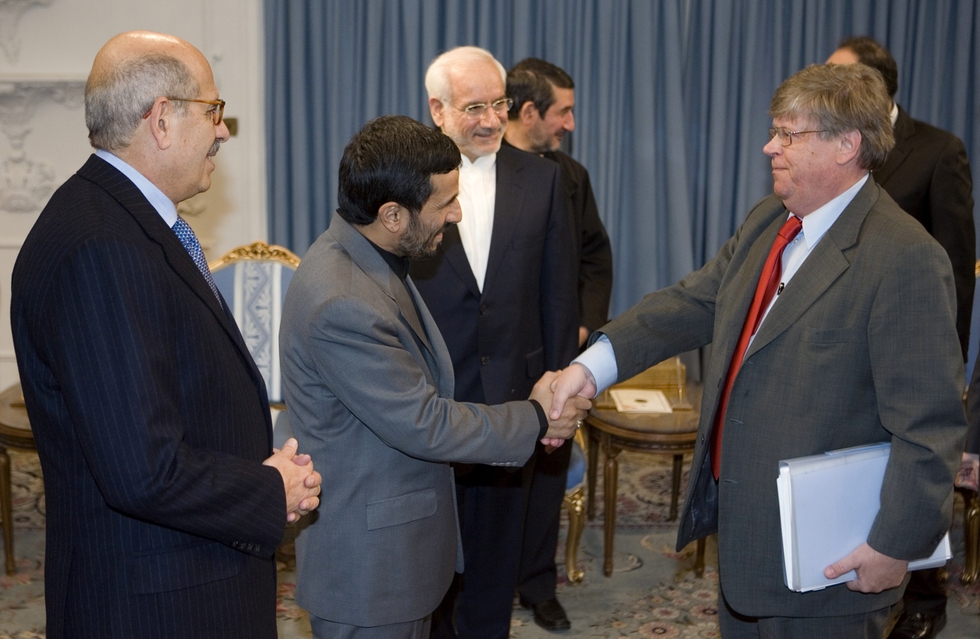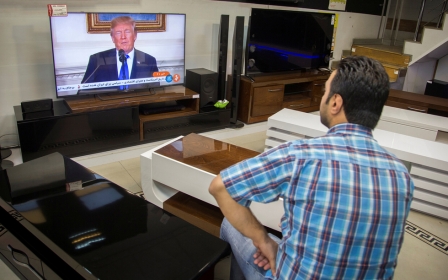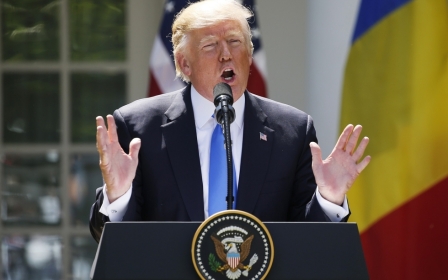Congress can get tough on Iran and still preserve nuclear deal: Former IAEA official

NEW YORK, United States - Washington can clamp down harder on Iran’s nuclear programme without ditching a 2015 deal brokered by the Obama administration, nuclear expert Olli Heinonen told Middle East Eye ahead of his congressional appearance this week.
On Wednesday, Heinonen, a former deputy chief of the International Atomic Energy Agency (IAEA), will advise lawmakers on how to handle Iran after US President Donald Trump’s decision this month to not certify Tehran’s compliance with the nuclear accord.
Instead of trashing the deal, Washington can urge allies and the IAEA to more strictly monitor Iran’s nuclear work, stop it from acquiring missile technology and ensure that enforcement continues once the deal expires, Heinonen will tell lawmakers.
“We have now experience of two years on the implementation of the JCPOA,” Heinonen told MEE on Monday, using the formal name of the Joint Comprehensive Plan of Action. “We see its strengths, but also its weaknesses.
“Any arms control, non-proliferation agreement cannot block the routes to nuclear weapons. It can only deter it, and it deters it with early detection. The early detection is only there if you have a robust verification scheme.”
This is lacking, said Heinonen. Washington should work with allies to boost IAEA inspections of Iranian military sites and report more about its military technology, uranium mining and enrichment activities and the development of new centrifuges.
The US should work with allies to stymie Iran’s development of nuclear-capable missiles, by slapping “secondary sanctions” on arms firms that sell such technology to Tehran, and the banks that facilitate transactions, he said.
Further, it should reach “complementary agreements” with allies to maintain a threat of sanctions being reimposed if Iran pursues doomsday weapons once the JCPOA’s provisions lapse, on various dates in the 2020s and 2030s.
“You don’t want to be … in a situation where Iran has developed much more powerful centrifuges, has developed its missiles in such a way that they can reliably carry nuclear weapons and fly far away,” said Heinonen.
“That’s the situation we’re in today with North Korea. So, in my view, it’s time to act.”
Critics of Heinonen claim that his stance against the Iran nuclear deal is fraught with inaccuracies, particularly in regards to the time allotted for inspections. He is also a known outspoken critic of the deal.
The accord restricts Iran’s nuclear activities with a view to keeping Tehran a year’s work away from having enough enriched uranium or plutonium for a nuclear bomb, should it pull out of the deal and sprint towards making a weapon.
The IAEA is allowed to request access to Iranian facilities, including military ones, if there are new and credible signs of banned nuclear activities there, according to signatories to the deal and officials from the agency.
If its concerns are not resolved, this can lead to a vote by its eight-member decision-making body – the US, Iran, Russia, China, France, Britain, Germany and the EU – in which five votes are needed for a simple majority.
Iran has reiterated its commitment to the terms of the deal despite Trump’s stance, but has also said its military sites are off-limits, raising the prospect of a stand-off if a request for access were put to a vote.
During its decade-long impasse with world powers over its nuclear scheme, Iran repeatedly refused IAEA visits to military sites, saying they had nothing to do with nuclear work and were beyond the UN watchdog’s purview.
Trump defied allies and adversaries on 13 October by refusing to certify that Iran was complying with the accord and threatened that he might ultimately terminate what he had dubbed “the worst deal ever negotiated”.
That threw the fate of the deal into the hands of Congress, by opening a 60-day window in which lawmakers could reimpose, or “snap back,” sanctions on Iran’s nuclear programme that were lifted under the accord.
Britain, France and Germany – European long-standing US partners who signed the agreement – are particularly concerned about Trump’s action and have lobbied Congress to preserve the nuclear pact.
But Heinonen challenged the idea that US allies would not revisit the deal, saying Australia and Canada have expressed concerns and French President Emmanuel Macron has sounded alarm over Iran’s ballistic missile work.
“There is appetite, but they’re not overly hungry. They hope that, with time, things change. I did my military service in the air force and one of the first lessons we were taught is that hope is not a method,” said Heinonen, from the Foundation for Defense of Democracies.
Heinonen will testify to the House Foreign Affairs Committee’s 13-member Subcommittee on the Middle East and North Africa alongside Mark Wallace, a former UN ambassador, and Philip Gordon, a former White House director for the Middle East.
Chairwoman Ileana Ros-Lehtinen, a Republican, said the session would assess Trump’s decision and explore how to strengthen the deal, address its “weaknesses and loopholes” and tackle “the totality of Iran’s illicit activity”.
Separately, the House is expected to vote this week on new sanctions on Iran’s ballistic missile programme and on Lebanon’s Iran-backed Hezbollah militia, senior Republicans have said, pursuing a tough line against Iran without immediately undermining the nuclear deal.
A ballistic missiles bill would toughen existing sanctions by going after entities with assets outside the US that support Iran’s ballistic missile programme, while another bill is directed at the Hezbollah militia’s allies in Lebanon’s government.
Middle East Eye propose une couverture et une analyse indépendantes et incomparables du Moyen-Orient, de l’Afrique du Nord et d’autres régions du monde. Pour en savoir plus sur la reprise de ce contenu et les frais qui s’appliquent, veuillez remplir ce formulaire [en anglais]. Pour en savoir plus sur MEE, cliquez ici [en anglais].




